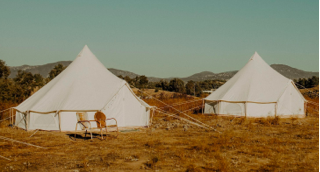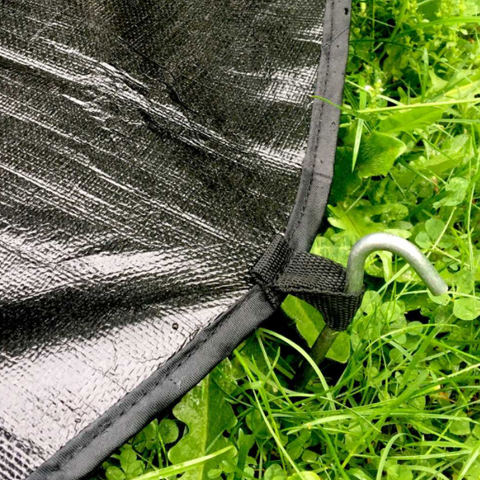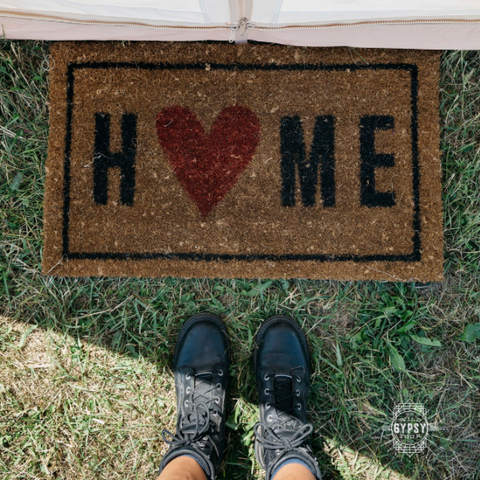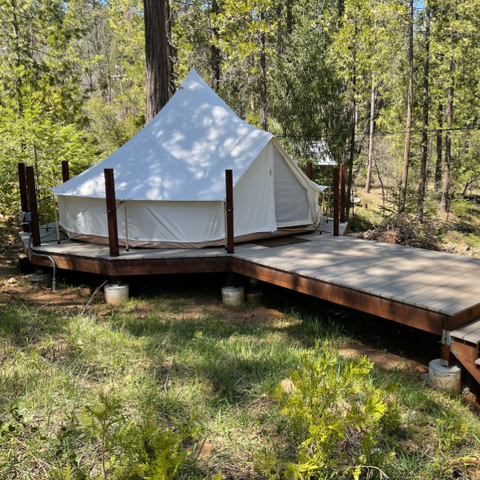LIVRAISON GRATUITE
Menu
-
- Boutique
- Tentes de camping
- Tentes cloches
- Tentes de festival
- Tentes de chasse
- Tentes Yourtes
- Tentes familiales
- Tente d'observation des étoiles
- Tentes cabanes
- Cadeaux de camping
- Tentes terrestres
- Poêles de tente
- Tente 4 personnes
- 6 Person Tents
- Tente 8 personnes
- 12 Person Tents
- Tente 6 personnes
- Équipement de camping
- Camping Chairs
- Shade Canopy Tents
- Camping Fans
- Prestations de service
- À propos
- Contact Us
- Reviews
-
- Connexion

Free Shipping

Pay No Sales Tax
30-Month Warranty
LIVRAISON GRATUITE
Tentes
À propos
Boutique


La liste LiT
Idées de glamping et de camping + ressources
Tent Floor Protection: 11 Creative & Practical Tips
8 lire la lecture
Maintain the integrity (and look) of your tent with proper tent floor protection. Roots, rocks, and more, the base of your tent sees a lot. So make sure to prevent sharp objects, moisture — whatever the bottom comes in contact with — from puncturing the material and causing damage.
Not sure how? Don’t worry, Life inTents knows what to do. From the moment you choose a site and pitch your tent, to the moment you breakdown the tent and pack it in, there are numerous ways to protect a tent floor. Here are some tips and creative ideas to consider for both car campers and stationary tent setups.
11 Tent Floor Protection Tips and Tricks
1. Choose a Smooth Tent Site
Tent floor protection begins with a proper setup, plain and simple. Because once a tent is pitched, it’s going to be hard to protect the floor of your tent from underneath. Here are a few tips to protect your tent floor from the get-go.
It’s always good practice to find a flat surface to pitch your tent. Obviously, you want to avoid placing a tent on top of rocky areas or surfacing tree roots, and prevent rain from pooling nearby. But more than that, when you do locate a nice flat surface, ensure that it is as smooth as possible.
Take a look around the area for any debris that could potentially puncture the tent floor. And remember, it might not be seen with the naked eye as you stand over the area. Sure, a canvas tent has a denser floor material, but even the smallest objects could cause abrasion to the floor, which could eventually harm the integrity of a tent.
So, if you want to be careful, give the area a good once-over and toss aside all the sticks, pebbles, shells, pinecones, acorns, et cetera that make their way onto the earth.
2. Always Use a Tent Footprint

Once you toss aside all the debris to ensure a smooth surface for your tent floor, give it an extra layer of protection with a tent footprint. Unfold and stretch out your footprint, whether it’s a tarp or groundsheet, to act as a mid-layer between the earth and the bottom of the tent.
This tip is imperative for several reasons. First, a groundsheet keeps out moisture and condensation that might arise from the earth’s surface, keeping the inside nice and dry. Second, a tarp or groundsheet adds an extra layer to protect against hard objects along the ground. Lastly, it makes packing up a bit easier, minimizing the time spent cleaning your tent’s base.
Alternative to a traditional footprint, folks swear by moving blankets. Yes, padded moving blankets. Their tough material protects a tent base from debris and adds extra insulation against cold ground. Not to mention they’re a cheap option for frugal campers and perfectly fit typical 2-, 3-, or 4-person nylon tents.
3. Remove Your Shoes
Another tent floor protection tip is to take off your shoes before entering the tent. It’s generally good practice anyway, to keep your tent clean. However, removing hiking boots and tennis shoes that could potentially pick up bits of debris — or even rocks and gravel from a nearby trail or parking lot — will prevent damage to the tent floor.
Encourage everyone staying at the campsite and visiting your tent to take off their shoes upon entering. One great way to encourage this good habit is to create a shoe removal sitting area. Outside the entrance to your tent, place a simple seat (think foldable camp stool, cooler lid, or even just a log) along with a mat to keep shoes off the ground, allowing a place to sit, remove, and store shoes.
The same advice could also be applied to pets. Dog nails can scrape away at a tent floor, not to mention track dirt. So be sure to wipe off paws at the door before letting them inside a tent. If you have time and think about it, trim back your dog’s nails to a safe length before heading on a camping trip. Shorter nails are less likely to cause accidental damage to the floor of the tent.
Then, if you so wish, slip on a pair of cozy socks or camp slippers. Yes, they have them for pups too! It’s a simple yet effective way to prevent shoes from tracking dirt and debris inside the tent.
4. Add a Doormat at the Tent Entrance

Whether you choose to create a shoe removal sitting area or not, a doormat is important. Laying down a doormat outside the tent entrance will give you a chance to wipe off your shoes, at the very least.
If you’re a hiker or hunter with heavy boots, or just a kid at heart who loves to play in the mud, we recommend a bootscraper. But, and can’t stress this enough, get yourself a scraper style mat to keep your shoes debris-free and your tent floor clean, protected, and safe.
5. Roll Out Tent Rugs or Mats
Another way to protect your tent floor is to roll out an interior rug or mat. Got a bunch of kids to wrangle that are always zipping in and out of your tent? Then a rug or mat is a must-have essential for protecting tent floors.
A large rug or two is also a perfect for protecting tent floors when you have camp furniture (more on that in a bit). Camp furniture can be quite heavy and is often designed with sharper edged feet and bases, so having a thicker rug beneath acts as a barrier to protect your tent floor.
Rugs and mats come in a variety of size options, styles, and materials, letting you decide how simple or elegant you want your tent setup to be. Here are a few ideas to consider:
- Natural Grass Rugs and Mats: If you want an eco-friendly rug option to protect tent floors, look no further! Grass rugs and mats are constructed of handwoven coconut fibers, which makes them pretty darn tough, not to mention biodegradable. Grass mats and rugs are also typically lined with cotton edges, giving a nice soft border along the edge. Coconut fiber mats are also water-resistant, insulative, and act as an insect-repellant. Grass style rugs are often designed without rubber or latex backing, inviting you to flip over as necessary to use both sides. Check out some natural grass rug options Life inTents offers:
- Collection of Area Rugs: If you have a larger canvas bell tent or wall style shelter tent, you might appreciate the look and style of home area rugs. Incorporating area rugs of various sizes, colors, and motifs can give a luxury look and bohemian vibe that protects your tent floor — and looks attractive while doing it! Car campers should consider how much room this takes up in the trunk. On the flipside, it’s a wonderful tent floor protection option for bell tent rental accommodations or a stationary tent used as a multipurpose space in a backyard.
- Interlocking Tiles: Interlocking tiles give cushion, floor protection, and even R-value to keep your tent warm and cozy. Foam interlocking tiles (also called fatigue matting) can be cut to size and are easy to clean. However, keep in mind they can become bulky, especially as your tent gets larger. Be sure to label each tile accordingly for a faster mat setup!
- Drymate Tent Carpet: Lots of expert campers will direct you to the premier tent rug maker brand called Drymate. Drymate carpet is highly reputable and known throughout the world of outdoor enthusiasts, and it’s easy to see why. Drymate tent carpet offers soft and insulative cold weather floor covering, has quick-drying properties, is easy to clean, and is durable and long-lasting. Which is why Life inTents partnered with Drymate to create a protective bell tent rug for our popular 16-foot/5-meter bell tent.
- Pawprints: Made specifically for dogs, pawprints are a common tent floor protection method that is unique to the Nemo tent brand. However, a pawprint can be made of any type of dog-friendly material, so long as it keeps dog nails from harming or scraping the tent floor. Dog beds and blankets are a nice option.
6. Be Mindful of Furniture and Sharp Objects
Rocks, furniture, camp gear or otherwise, just be mindful of sharp objects or jagged corner edges that could puncture a tent floor. Inflatable-style camp gear is ideal, but if you wish to take advantage of a spacious tent interior with more homey-like furniture, then be mindful of their bases and feet. Start by choosing camp furniture and camp gear designed with smooth, rounded edges and feet to minimize the chance of damaging or scuffing tent floors.
7. Place Stoves On a Fireproof Mat
Want to add a wood burning stove to your tent? Learning wood stove safety is imperative for any tent owner. But when it comes to tent floor protection, make sure to assemble a wood stove properly to maintain fire safety, and place it on top of a fireproof floor mat to catch any sparks or hot coals that might tumble out. Also be sure the tripod legs are secure and stable, especially if there are layers of more protective rugs beneath the mat.
8. Maintain Good Ventilation
Condensation can and will occur inside a tent, which leads to dampness that, in turn, can potentially damage a tent floor. The trick to preventing condensation is maintaining good ventilation. Learn the best tips for tent ventilation to prevent moisture buildup and keep away mold, mildew, and so much more. Stopping this dampness in its tracks can save the floor of your tent, as well as its walls, and other materials.
9. Sweep and Clean Your Tent Floor Regularly
Routinely cleaning your tent helps prolong its life in several ways. And this is especially true with the tent floor. Sweeping and/or shaking out the floor of your tent will ensure that sand, dirt, and naked-to-the-eye particles are not causing abrasion and wearing down the tent floor over prolonged periods of time.
It’s smart to give the tent floor a gentle cleaning with a damp cloth too. Sometimes, sticky residues like tree sap, spilled food and drinks, and more, can attract insects or even critters who, if desperate enough, will eat away at the material.
10. Properly Pack and Store Your Tent
After cleaning your tent, make sure to give it time to dry before storing it. Mold and mildew can harm your tent’s floor the same way it can harm its canvas or nylon walls. So even if you have to pack up in the rain, unfold and pitch it again once you’re home and allow it to dry out completely!
11. Elevate Your Tent With a Wooden Platform

One way to protect your tent flooring is to raise it off the ground. Wooden deck platforms offer a flat and smooth surface that elevates a stationary tent off of hard rocks, sticks, brush and anything else that can harm or puncture the floor of your tent. Moreover, if you wish, you can still incorporate a footprint, groundsheet, area rugs or any number of floor protection elements to your tent. Not to mention a tent platform looks attractive too!
Practice These Tent Floor Protection Tips
Just as you wouldn't walk around the campsite or a trail in bare feet, you wouldn’t pitch a tent without floor protection. Caring for the base and interior flooring of a tent will not only lengthen its life, but provide your family and fellow campers an extra bit of comfort, coziness, and even aesthetically-pleasing style.
Do you have any tent floor protection tips we haven’t mentioned? Share and let us know in the comments. We love to hear the creative and practical advice camping folk like you have discovered!
Related Resources

LA LISTE ÉCLAIRÉE 2 lire la lecture
Idées de camping dans la cour avec des enfants pendant le COVID-19
Le camping familial pendant le coronavirus peut être tout aussi une aventure que le camping dans l
LA LISTE ÉCLAIRÉE 4 lire la lecture
Can Glamping Businesses Survive a Recession?
Examining the Resilience of Luxury Camping Businesses Glamping, the luxurious cousin of traditional Blogues populaires
1. Qu’est-ce que le Glamping ?
2. Comment démarrer une entreprise de glamping
3. Créez une plate-forme de tente cloche
4. Les meilleures toilettes portables pour le camping
5. Comment installer et plier une tente cloche
6. Les meilleurs poêles de tente à cloche – Façons de chauffer une tente en toile
Produits populaires
S'abonner
Inscrivez-vous pour recevoir les dernières nouvelles sur les ventes, les nouveautés et les conseils
DEVENEZ UN INITIÉ
Nous partagerons périodiquement avec vous des idées, des sorties de tentes cloches, des offres spéciales et des notifications d'événements.


